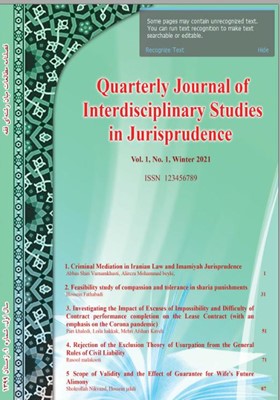Criminal Mediation in Iranian Law and Imamiyah Jurisprudence
Subject Areas : فصلنامه مطالعات میان رشته ای فقهAbbas Shiri Varnamkhasti 1 * , Alireza Mohammadbeyki 2
1 - Associate Professor of Criminal Law and Criminology, Faculty of Law and Political Science, University of Tehran, Tehran, Iran. (Corresponding Author)
2 - faculty member of jurisprudence and Islamic law, Islamic Azad University, Central Tehran Branch, Islamic Azad University, Tehran, Iran.
Keywords: mediation, Dejudicialization, solving disputes, consensual justice,
Abstract :
Criminal Mediation in Iranian Law and Imamiyah JurisprudenceAbstractSince the formation of the public justice, the government as the institution responsive to the criminal acts has used formal authoritarian policies. But by the formation of civil society and its effects on criminal law and criminology, this approach has faced with philosophical post-modern criticisms regarding its costs and effectiveness. Meanwhile, realistic managing and economic attitude has resulted in returning to the informal solutions for the disputes while ignoring governing role of the governments and outsourcing some of the duties and authorities all of which characterized by dejudicialization.Adopted approach by the Code of Criminal Procedure 2014 can be considered as the starting point for it to be structured in Iranian criminal law which aside from legal common basics it has also jurisprudential bases.The present research analyzes informal solutions - criminal mediation, in particular - of law as a known and frequently used method and covers its weak points by providing justifications or logical basics. The results of the analyses showed that despite the application of these solutions regarding minor offences (offences of 6, 7, 8 degrees) there is a deep gap to consensual justice to be realized. Nevertheless, the examples of legal reforms are as the indications of policy making for the consensualization of legal procedure and recognition of the basics and logic of informal solutions for solving criminal disputes which can be a starting point for extending the mechanisms of dejudicialization to the offences of higher degrees or non-criminal offences.Key words: dejudicialization, mediation, solving disputes, consensual justice
_||_

